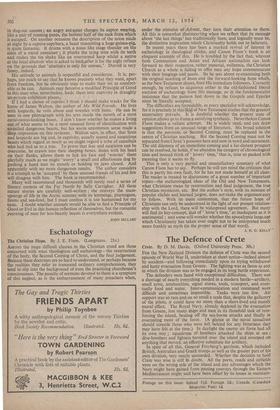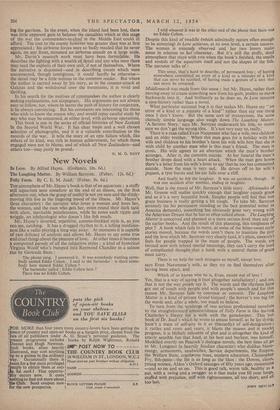The Defence of Crete
Crete. By D. M. Davin. (Oxford University Press. 30s.) FOR the New Zealand Division the defence of Crete was the second episode of World War H, undertaken at short notice—indeed almost by accident—and following immediately upon its trying withdrawal and hasty evacuation from Greece. The fighting was as fierce as any in which the division was to be engaged in its long battle experience.
The defenders were faced with exceptional difficulties. There was a shortage of nearly everything needed in a modern battle—artillery, small arms, ammunition, signal stores, tools, transport, and even- tually food and water. Inter-communication and command were difficult and sometimes impossible. Tanks were too few. Air support was so rare andion so small a scale that, despite the gallantry of the pilots, it could have no more than a short-lived and mainly moral effect. The Royal Navy, already depleted in the evacuation from Greece, lost many ships and men in its threefold task of rein- forcing the island, beating off the sea-borne attacks and finally in evacuating most of the force. (A glance at the naval casualties should console those who were left behind for any bitterness they may have felt at the time.) In daylight the enemy air force had all its own way ; squadrons of bombers attacked the ships at sea ; dive-bombers and fighters hovered over the island and swooped on anything that moved, an effective substitute for artillery.
In spite of all this, General Freyberg's garrison, which included British, Australian and Greek troops as well as the greater part of his own division, very nearly succeeded. Whether the decision to hold Crete was wise is still in doubt. All the ports, roads and airfields were on the wrong side of the island and any advantages which the Navy might have gained from passing convoys through the Eastern Mediterranean might well have been offsef by its losses in maintain-
Postage on this issue: Inland lid. Foreign 2d.; Canada (Canadian Magazine Post) Id. Ins the garrison. In the event, when the island had been lost, there was little apparent gain to balance the casualties which at this stage of the war the commanders-in-chief in the Middle East could ill afford. The cost to the enemy however was greater than was at first appreciated ; his airborne forces were so badly mauled that he never again, on any front, mounted an airborne assault on a large scale.
Mr. Davin's research work must have been formidable. He describes the fighting with a wealth of detail and any who were there may read the exploits of their own unit, if not of themselves. Where the narrative is disjointed—and in describing events which were unconnected, though contiguous, it could hardly be otherwise— the detail may be a little tedious to the common reader. But where the author is carried away by his story, as in the counter-attack at Galatas and the withdrawal over the mountains, it is vivid and thrilling.
In his search for the motives of commanders the author is clearly seeking explanations, not scapegoats. His arguments are not always easy to follow, nor, where he leaves the path of history for conjecture, is he always convincing. But his comments are interesting for those who wish to know the reason why, and would repay careful study by any who may be concerned, at either level, with airborne operations. This book is one in the series of official histories of New Zealand in the Second World War. It has clear maps and a well chosen selection of photographs, and it is a valuable contribution to the records of the war. It tells the story of an epic failure Which, like others of its kind, was rich in human achievement, for which those engaged were not to blame, and of which all New Zealanders—and others too—may justly be proud?
G. M. 0. DAVY











































 Previous page
Previous page